Select "CLUTCH SWITCH" parameter on the Scantool.
Specification : When clutch switch released : "CLUTCH SWITCH" : OFF
When clutch switch depressed : "CLUTCH SWITCH" : ON
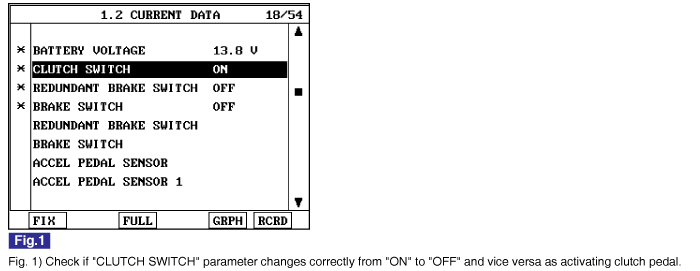
Clutch switch is connected to clutch pedal and transmits clutch operating state to ECM.When clutch pedal is depressed during driving, engine load changes from loaded to none loaded condition. However, ECM considers vehicle to be loaded becuase VSS signal is still inputted to it. therefore, ECM controls none loaded engine with the condition suitable for loaded engine.Accordingly, optimum fuel injection control is not performed then, RPM becomes unstable and smoke is produced. Clutch operation is detected through clutch switch signal. This signal enables ECM to cope with instant change of load condition. Besides, clutch switch signal is used to detect engaged gear with vehicle speed and engine speed.
P0830 is set when no clutch switch signal change is detected while gear shifts 4 times at above 15Km/h and 1500rpm. This code is due to 1) clutch switch component failure or 2) open or short in circuit 3) improper height of clutch pedal. ※ECM recognizes ingaged gear with rpm and vehicle speed sensor signal.
Item | Detecting Condition | Possible Cause | ||
DTC Strategy | ● Signal monitoring | ● Clutch S/W circuit ● Clutch S/W component ● Clutch S/W pedal hight | ||
Enable Conditions | ● Engine running | |||
Threshold Value | ● No clutch switch signal change is detected until gear shifts 3 times at above and 1500rpm | |||
Diagnostic Time | ● immediately | |||
Fail Safe | Fuel cut | NO | ||
EGR Off | NO | |||
Fuel Limit | NO | |||
Check Lamp | NO | |||
Condition | Clutch Pedal Depressed | Clutch Pedal Released |
Switch Operation | Switch ON | Switch OFF |
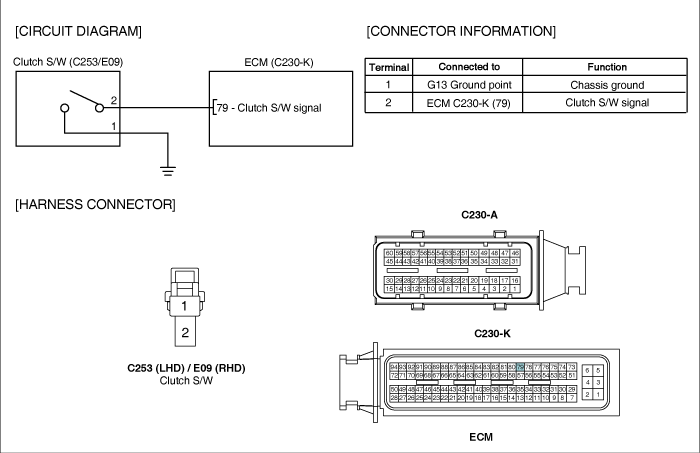
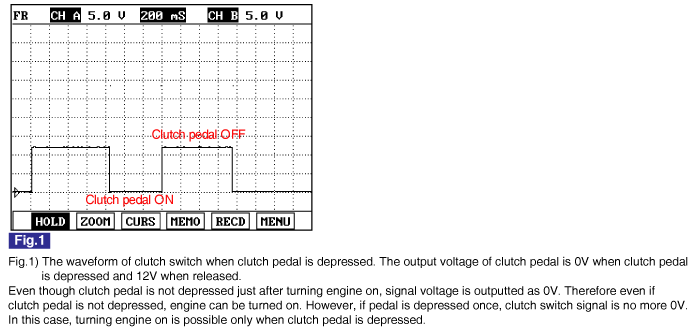
Connect Scantool to Data Link Connector (DLC).
Warm engine up to normal operating temperature.
Turn "OFF" electrical devices and A/C.
Select "CLUTCH SWITCH" parameter on the Scantool.
Specification : When clutch switch released : "CLUTCH SWITCH" : OFF
When clutch switch depressed : "CLUTCH SWITCH" : ON

Electrical systems consist of a lot of harness and connectors, poor connection of terminals can cause various problems and damge of component.
Perform checking procedure as follows.
Check damage of harness and terminals : Check terminals for contact resistance, corrosion and deformation.
Check connecting condition of ECM and component connector : Check terminal seperation, damage of locking device and connecting condition between terminal and wiring.
Disconnect the pin which requires checking at male connector and insert it to the terminal at female connector for checking connecting condition. ( after checking, reconnect the pin at correct position. )
Is the problem found?

▶ Repair the trouble causing part and go to "Verification of Vehicle Repair".

▶ Go to "Signal Circuit Inspection".
Check clutch switch pull-up voltage
IG KEY "OFF", ENGINE "OFF"
Disconnect clutch switch connector.
IG KEY "ON"
Measure the voltage of terminal 2 of clutch switch connector.
Specification : 11.5V~13.0V
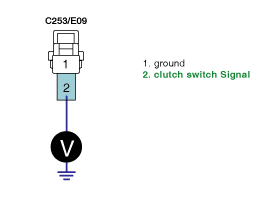
Is the measured voltage within the specification?

▶ Go to "Ground Circuit Inspection".

▶ Go to "2.Check open in clutch switch signal circuit" as follows.
Check open in clutch switch signal circuit
IG KEY "OFF", ENGINE "OFF"
Disconnect clutch switch connector and ECM connector.
Check continuity between clutch switch connector terminal 2 and ECM connector terminal 79.
specification : Continuity ( below 1.0Ω )
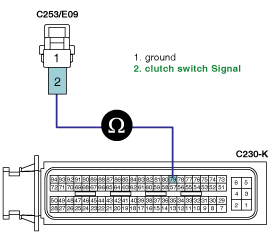
Is the measured resistance within the specification?

▶ Repair short to ground in signal circuit and go to "Verification of Vehicle Repair".

▶ Repair open in signal circuit and go to "Verification of Vehicle Repair".
IG KEY "OFF", ENGINE "OFF"
Disconnect clutch switch connector.
IG KEY "ON"
Measure the voltage of clutch switch connector terminal 2. [ TEST "A" ]
Measure the voltage between clutch switch connector terminal 2 and terminal 1. [ TEST "B" ]
( Terminal 2 : Check + prove , terminal 1 : Check - prove )
Specification : [TEST "A"] Voltage - [TEST "B"] Voltage = below 200mV

Is the measured voltage within the specification?

▶ Go to "Component Inspection".

▶ When "B" voltage is not detected : Repair open in ground circuit and go to "Verification of Vehicle Repair".
▶ When the voltage difference between "A" and "B" is above 200mV : Eliminate the causes of excessive resistance and go to "Verification of Vehicle Repair".
IG KEY "OFF", ENGINE "OFF"
Disconnect clutch switch connector.
Check continuity between clutch switch component terminal 1 and 2 as depressing clutch pedal.
Clutch pedal depressed : Continuity (below 1Ω)
Clutch pedal depressed : Discontinuity (Infinite Ω)
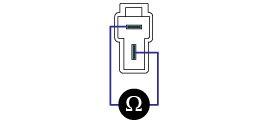
Is the measured resistance within the specification?

▶ Go to "Verification of Vehicle Repair".

▶ After checking height of clutch pedal, if therer is no problem, replace clutch switch and go to "Verification of Vehicle Repair".
After a repair, it is essential to verify that the fault is corrected.
After connecting Scantool select "DIAGNOSTIC TROUBLE CODES(DTCs)" mode.
Clear recorded DTC using Scantool.
Drive the vehicle within DTC "Enable conditions" in "General information".
After selecting "DIAGNOSTIC TROUBLE CODES(DTCs)" mode and check if DTC is recorded again.
Are any DTCs recorded ?

▶ Go to the DTC guide of recorded NO. in Scantool.

▶ System operates within specification.